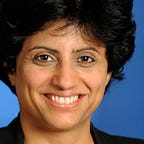Copy the masters.
“All through my career, I was always apprenticing on something.”
Gini Rometty, former CEO of IBM, talks about how she was asked to lead a global consultancy job within IBM, as an engineer without an MBA. She had to find a way to learn on the job. She went on to lead that division of global sales, marketing, and strategy, and then went on to run IBM as chairman, president, and CEO, stepping down in 2020.
The term, “apprentice,” has its roots in 1300, from the French word, aprentiz, meaning “someone learning.”
Apprenticeship is not formal, textbook education. It’s not a classroom, sit-and-listen, read-lots-of-books, answer-exam-questions experience. Rather, it’s learning by doing, under the watchful tutelage of an expert. It’s the opportunity to learn by observing someone who is a master of their craft, absorbing, copying, refining, asking questions, testing your ideas with them, and finding your own voice at the end. It’s becoming a master by starting out with copying a master.
Apprenticeship is a skills-first approach to learning.
Most of the classical painters started out as apprentices. Raphael was an apprentice of Perugino, in whose workshop he gained hands-on knowledge and experience for 4 years. Leonardo da Vinci was apprenticed to Andrea del Verrocchio, the official sculptor to the ruling Medici family in Florence at the time. Verrocchio’s workshop was a fertile apprenticeship ground for many great artists. Botticelli, Luca Signorelli, Domenico Ghirlandaio, and Filippino Lippi all passed through this workshop at some point or the other in their career. “Whatever painters have that is good they drank from Verrocchio’s spring,” says the Florentine poet, Ugolino Verino.
This is true of great inventors. Thomas Alva Edison was an apprentice telegrapher, and his on-the-job training set up him to become an entrepreneur later, when he produced the Edison Universal Stock Printer and other printing telegraphs that brought him his first recognition. In turn, Edison had his own team of “muckers,” apprentices who worked with him on testing and refining ideas. Edison is known to have said that his apprentices worked with him because it was “not the money they want, but the chance for their ambition to work.”
I’ve been fortunate in my own apprenticeships. In all of these cases, I watched an expert at work, and I breathed it in. What I sought to do was to copy them. Obsessively. (I am not a fan of adverbs, but I needed one here.) I observed their mastery of their craft, how they carried themselves, how they thought about solving problems, how they interacted with others, how they communicated, and how they responded to situations.
I took it all in, and then made it my own.
I learned speaking skills and thinking skills from my Ph.D. advisor, Prof. Michael Melliar-Smith, who could command a stage and engage an audience with information, humor, intelligence, and pure childlike enthusiasm and wonder. Watching Michael at work made me a better speaker.
I learned writing skills, and the ways to organize and present my thoughts from my Ph.D. advisor, Prof. Louise E. Moser, who could look at any blob of text and turn it into beautiful prose, with an unmatched analytical and methodical way of presenting an idea on paper. Watching Louise at work made me a better writer.
I learned teaching skills from Prof. Phil Koopman, by co-teaching with him, by watching him structure his classes, structure the teaching process, how he worked to ensure that every student in class walked away with the learning outcomes that he wanted them to have. Watching Phil at work made me a better teacher.
I learned how to be a faculty member from Prof. Dan Siewiorek, who showed me how to fall in love with a problem, how to put students first, how to conduct research with empathy for the user at its core, and how to solve problems that matter. Watching Dan at work made me a better researcher.
I learned how to sell from Dave Soltesz, who showed me how to think about looking at an idea, seeing its potential to grow an audience, seeing how the idea could meet a market, and how to sift good product ideas from bad. Watching Dave at work made me a better businesswoman.
I am a product of Michael, Louise, Phil, Dan, and Dave in so many ways. Every day, I catch myself doing something that comes directly from them, and from a place of trying to attain their mastery of what they do. Watching them at work has stayed with me, is distilled into my subconscious actions and thoughts, far more than my formal education and than any in-class experience that I have had.
I grew from every interaction with these fine people. They changed me. They changed my thinking. They changed my attitude. They changed how I carry myself in any situation.
Every day, we find ourselves in situations where we can acquire a skill by copying someone with an absolute mastery of that skill. Every day, we can apprentice ourselves by watching a master at their craft, absorbing, imitating, and finally making it our own.
Who we copy makes us who we are.
